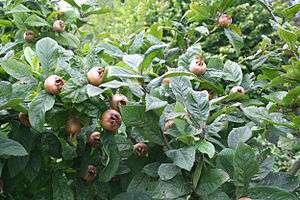nespereira
Galician

Etymology
From Old Galician and Old Portuguese, from local Medieval Latin nesperaria, attested since the 10th century, from Vulgar Latin *nespirum, from mespilum, from Ancient Greek μέσπιλον (méspilon).
Noun
nespereira f (plural nespereiras)
Usage notes
Related terms
References
- “nesper” in Xavier Varela Barreiro & Xavier Gómez Guinovart: Corpus Xelmírez - Corpus lingüístico da Galicia medieval. SLI / Grupo TALG / ILG, 2006-2016.
- “nespereira” in Dicionario de Dicionarios da lingua galega, SLI - ILGA 2006-2013.
- “nespereira” in Tesouro informatizado da lingua galega. Santiago: ILG.
- “nespereira” in Álvarez, Rosario (coord.): Tesouro do léxico patrimonial galego e portugués, Santiago de Compostela: Instituto da Lingua Galega.
Portuguese
Noun
nespereira f (plural nespereiras)
This article is issued from
Wiktionary.
The text is licensed under Creative
Commons - Attribution - Sharealike.
Additional terms may apply for the media files.